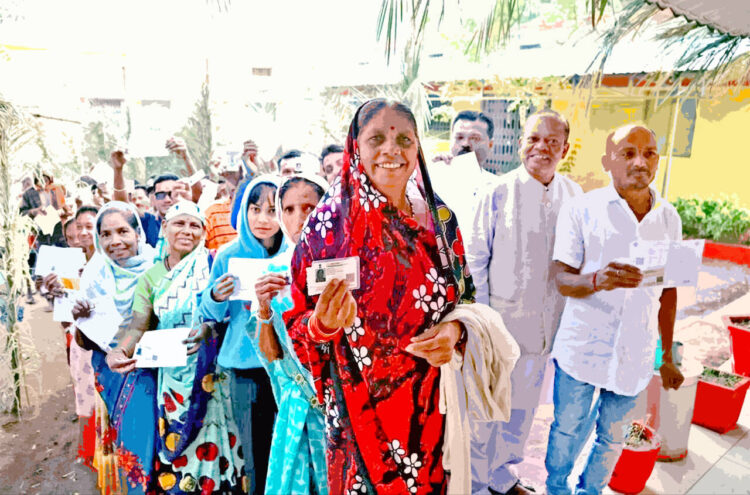“Vote is a matter of conscience. Do not sell it. Do not destroy it. When you vote take a momentous decision, please do not take it just on the spur of the moment. Vote is an individual right to be exercised socially. It symbolises your freedom; use it freely. If you are a democrat do not be dictated by anybody but your conscience. Political parties that stand for the people also stand on the strength of the people. If the people want that nobody should bend them the people should lend them their strength. It is the people who are the architects of political parties and, through them, their political destiny. Let them succeed in the great test they are faced with”. – Pt Deendayal Upadhyaya, Your Vote – 1, Organiser, December 4, 1961
As the election schedule is announced and nominations for the first phase of voting are filed, the great festival of Bharatiya democracy has begun. On the one hand, the Bharatiya Janata Party (BJP)-led National Democratic Alliance (NDA) under the leadership of Prime Minister Narendra Modi is asking for the mandate based on the performance of his Government and his vision for 2047, while the Congress-led INDI Alliance is still in disarray and leaderless. In such a scenario, there may be a tendency to be lethargic and take our democracy for granted. What should the approach of the people who believe in the democratic process be, and what role should they play in this electioneering?
Of course, exercising our democratic duty of voting is the first responsibility of each responsible voter. Striving for a hundred per cent vote at every polling booth in a free and fair atmosphere is the essential pre-condition for a healthy democracy. Registration of voters – the stage that has passed, mobilisation of voters, and inspiring and educating them to vote on national issues are essential stages we should pass through. There are still certain areas, like in West Bengal or Bastar, where, without the use of police force, some political forces do not allow voters to exercise their franchise, which is a worrisome feature. The Election Commission of Bharat strives to minimise such a situation, and as voters of Bharat, we should support all those actions.
Being a multi-party democracy, the tendency to create divisions based on various faultlines will increase. We need to establish dialogues at the social level where such nefarious designs are not successful. Here, the term first used by Pt Deendayal Ji and recently emphasised by Dattatreya Hosabale, Sarkaryavah, Rashtriya Swayamsevak Sangh (RSS) called Lokmat Parishkar (Refining Public Opinion) becomes very critical. In a democracy, we need to continuously reform and refine public opinion on issues of national importance so that the elections do not remain just an exercise of seeking political power for a party or individuals.
In the last seventy-five years, we have made a remarkable achievement in establishing and sustaining democracy in the sense of adult franchise despite the apprehensions of many Western experts and their blind followers in Bharat. Even in the draconian phase of democracy, we countered it democratically and reset the electioneering process. We should be proud of the same. At the same time, we should be cautious of some worrying trends. The excess use of money, divisive use of identities – sometimes even above our national identity and treacherous use of foreign land to malign Bharat and Bharatiya democracy are some of the symptoms that we should be wary of. The parties and their ideologies used to be a critical factor in election campaigns. The manifestos and programmes were discussed and communicated through various platforms, including through public broadcasters. Now, the centrality of ideology and manifesto has diminished. The political battle is now based on the alignment forces that are pro-Bharat and those who are upset with the rise of Bharat. Many foreign actors are upset with Bharat’s growing strength and sense based on its civilisational consciousness. They will try to meddle in our elections through various means. The manipulative use of technology, algorithms and data to influence public opinion from foreign soil is also a visible ploy. In such a situation, the role of responsible voters is all the more crucial. The filtration and formulation of public opinion based on correct and reliable information is our democratic duty.
The character of politics has undoubtedly changed in the last 10-15 years. The delivery of Government schemes on the ground, infrastructure, internal and external security and national consciousness based on our national ethos has dramatically improved. This process has naturally increased our expectations and inspirations. Now is the time to give a collective shape to those dreams and consolidate this process of expressing our national selfhood in every aspect of national life so that our democracy leads towards perfection based on our indigenous parameters of Surajya and Sushasan. Let us all contribute to the process of achieving this goal!




















Comments